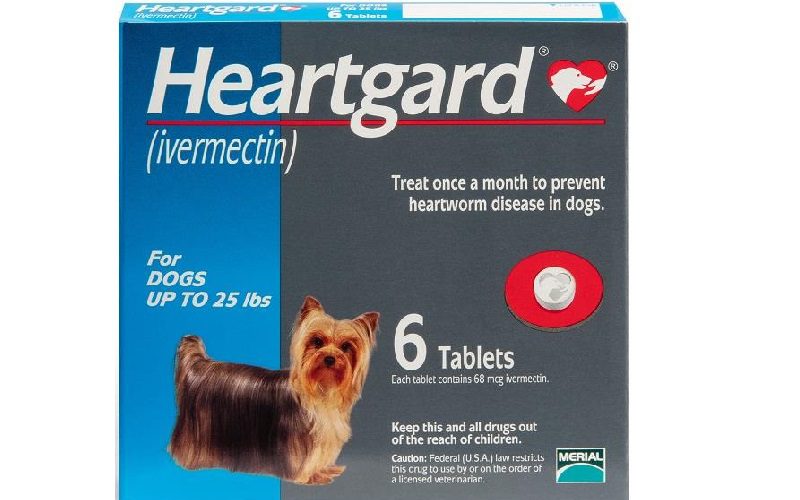Last Updated: 9 months ago
Heartgard for dogs has been a widely debated subject of late. This immensely popular prescription medication has suffered a dent in its popularity after receiving some negative press courtesy of an ex-employee.
But veterinarians still consider it to be the holy grail in cases of parasitic infestation in dogs.
One of the infestations being heart worm, which is also considered to be a silent killer that shows no symptoms until the condition has progressed to extreme levels.
But even the slightest negative press is enough to trigger skepticism in the minds of pet owners. As of now, the conundrum is whether the drug is indeed as effective as it is touted to be.
Well, today we will walk you through the basics of heartgard for dogs. Its benefits, the side effects and the possible conditions in which you can consider using this for your dogs.
What is Heartgard For Dogs?

Heartgard for dogs is a chewable prescription medication that contains the active ingredients Ivermectin and Pyrantel. It is prescribed for the prevention of heartworm in dogs, which is caused by the Dirofilaria immitis nematode that is spread by a mosquito bite.
In many parts of the world, the condition is endemic, and heartgard is used compulsorily as a preventive measure.
After a mosquito bite, the larvae eventually mature into an adult heartworm and get lodged into the lungs, the heart, and the blood vessels surrounding these organs and reproduce.
Adult heartworms can grow up to 10–12 inches in length and can live as long as 7 years in the body of a dog. In extreme cases, a dog can have as many as 250 worms living in their body.
What makes the condition so difficult to diagnose is because the symptoms can be vague and similar to other conditions. Dogs can be lethargic, have a mild cough, get fatigued even after mild exercise, have reduced appetite and lose weight suddenly.
In extreme cases, heartworm can cause a sudden block of blood supply to the heart which can lead to cardiovascular collapse called caval syndrome.
Heartgard works by preventing the larvae from maturing into adults in the dog’s body.
Since the severity of the condition is directly dependent on the number of parasites present in the body of the dog and the response of the body to the infestation, timely administration of Heartgard Plus for dogs can help save the dog’s life.
If left untreated, on the other hand, heartworm can be a potentially life-threatening condition.
Along with heartworm, the combination medicine is also used for controlling ascarids and hookworms.
What Are the Benefits Of Heartgard?

A few years ago, Heartgard was the only prescription medication available for the prevention of heartworm in dogs. Today, heartworm treatment options are dime a dozen. Yet, heartgard continues to be the most popular drug used for treating the condition.
And it is not without reason either.
- Heartgard can be administered even to puppies who may get infected with heartworm during the nursing stage. Along with early prevention of heartworm, it also benefits the puppies by helping control hookworm and roundworm infestations.
- Heartgard Plus is a chewable tablet available in a multitude of flavors. The beef flavored chewable is most preferred by dogs and is easy to administer.
- Easiest way to prevent a potentially fatal condition in dogs.
What Are Some Of The Side Effects Of Heartgard Plus on Dogs?
Now that you know about the potential benefits, let’s talk about some of the more serious accusations that have been levied against the drug in recent times.
Heartgard Plus was recently linked with serious side effects in specific dog breeds. However, it has since been proven that the side effects were most likely to occur in dogs that already had a heartworm infection where the worm had reached adulthood and was not in the larval stage.
The dying adult larvae often trigger a severe side effect in dogs, which can be life-threatening.
As a result, most veterinarians test the dog for heartworm before prescribing heartgard.
Dog breeds with multi-drug sensitivity like the long-haired whippet, Australian Shepherd and Collie are said to be among the high-risk group.
What Is The Ideal Heartgard Dosage For Dogs?
Since Heartgard is a combination drug, the dosage varies according to the concentration of the specific ingredient in the medication and the body weight of the dog.
Different doses with varying concentrations of ivermectin and pyrantel are available. Heartgard Plus for dogs under 25 lbs. has blue color coding on the package indicating the ivermectin content at 68 mcg and the Pyrantel content at 57 mg.
The green color-coded package is for heartgard plus for dogs 26-50 lbs. It has 136 mcg Ivermectin and 114 mg of Pyrantel.
Lastly, the Brown color coded package is for large sized dogs. This heartgard plus for dogs 51-100 lbs. has 272 mcg of Ivermectin and 227 mg of Pyrantel.
It is an oral chewable tablet, and most vets recommend that dogs be encouraged to chew the tablet as opposed to swallowing it.
If your pet refuses to chew it, then you can also crush the tablet into pieces and give it to the dog. You can also crush it and add it to dog food.
The ideal and recommended dose is one tablet monthly and the minimum dosage is 2.72 mcg of Ivermectin per lb. of bodyweight and approximately 2.27 mg of Pyrantel per lb. of bodyweight of the dog.
Precautions While Using Heartgard Plus For Dogs
The American Heartworm Association recommends heartworm prevention year-round. But vets and pet parents usually do a heartworm test once every six months and decide whether to continue or discontinue treatment.
Resources:



